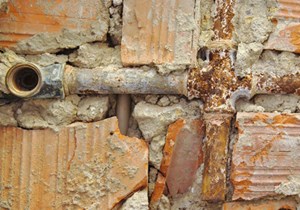Denver gets EPA approval for $700 million lead water pipe removal plan
(AP) — The Environmental Protection Agency on Thursday approved a nearly $700 million plan to remove all lead water pipes in the Denver region, saying the local water utility's approach for reducing lead levels is succeeding and making swift progress. It's a recognition that cities can effectively address the lead pipe crisis if they try.
Lead water lines are a major source of lead poisoning. The metal causes brain damage and the agency says no amount is safe for children's bodies.
Denver's water had high levels of lead a decade ago, testing showed. In response, local officials promised in 2020 to replace between 64,000 and 84,000 lead pipes in 15 years, a comparatively fast pace. To make sure people aren't getting lead poisoning in the meantime, they also promised to hand out lead-removing filters to residents. So far the utility has dug up 15,000 lead pipes.
"From our perspective, Denver Water has one of the most successful (lead water line) replacement programs in the country," the environmental group EDF told EPA in official comments.
Federal officials say Denver Water's approach could be a model for other cities and is unique. In addition to removing all pipes and handing out filters, it also proposed an alternative water treatment method because the standard additive, orthophosphate, can harm waterways. Last they held community meetings to persuade residents to grant officials access to their property to replace lead pipes.
"We have to instill enough trust in our customers that they'll open their door to us," said Alexis Woodrow, Denver Water's lead reduction program manager.
Officials also said they are targeting lead pipe replacements near schools and daycare centers. The Denver Water proposal required special permission from EPA. Now what was a trial can move forward in full.
Lead pipes were installed decades ago and there are millions underground around the country carrying tap water into homes and businesses. Most, but not all, are in the Midwest and Northeast.
President Joe Biden signed an infrastructure bill last year that provides $15 billion for lead pipe work. It will significantly help but won't be enough to remove all lead pipes. The law will provide $76 million for Denver Water's replacement efforts. Some of the project's cost will be paid by customers in the form of water rates.
Flint, Michigan's lead water problems focused national attention on the danger of lead in water. Other cities like Benton Harbor, Michigan and Newark, New Jersey have faced flat out crisis.
The responses to these crises have varied. In Benton Harbor, filters were not part of the solution, forcing people to go to distribution centers to pick up bottled water for cooking and drinking. In Denver, filters are a key part of the response. With aggressive outreach efforts, most residents who should be using them, are, according to Denver Water.
The city's latest tests show that lead levels have now dropped below federal limits.
"It is going to have long-term benefits for these communities," said KC Becker, head of the EPA region that includes Colorado.
Related News
From Archive

- Glenfarne Alaska LNG targets late-2026 construction start for 807-mile pipeline project
- U.S. water reuse boom to fuel $47 billion in infrastructure spending through 2035
- $2.3 billion approved to construct 236-mile Texas-to-Gulf gas pipeline
- Major water pipe break in Puerto Rico hits over 165,000 customers
- Potomac River Tunnel project enters construction phase beneath Washington, D.C.
- Pennsylvania American Water launches interactive map to identify, replace lead water service lines
- Trump's tariffs drive $33 million cost increase for Cincinnati sewer project
- Utah city launches historic $70 million tunnel project using box jacking under active rail line
- Tulsa residents warned after sewer lines damaged by boring work
- Fatal trench collapse halts sewer construction in Massachusetts; two workers hospitalized




Comments